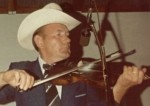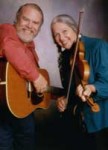 From October 1, 2010 through to the end of September 2011, we will, each day, celebrate the life of Bill Monroe by sharing information about him and those people who are associated with his life and music career. This information will include births and deaths; recording sessions; single, LP and CD release dates; and other interesting tidbits. Richard F. Thompson is responsible for the research and compilation of this information. We invite readers to share any tidbits, photos or memories you would like us to include.
From October 1, 2010 through to the end of September 2011, we will, each day, celebrate the life of Bill Monroe by sharing information about him and those people who are associated with his life and music career. This information will include births and deaths; recording sessions; single, LP and CD release dates; and other interesting tidbits. Richard F. Thompson is responsible for the research and compilation of this information. We invite readers to share any tidbits, photos or memories you would like us to include.
- June 26, 1926 Kenneth Clayton ‘Kenny’ Baker was born in the coal-mining town of Jenkins, eastern Kentucky. *
- June 26, 1936 Phil Williams was born in Seattle, Washington. **
- June 26, 1954 Recording session – During an afternoon session at the Bradley Studio in Hillsboro Village Bill Monroe and the Blue Grass Boys recorded Close By, My Little Georgia Rose and Put My Little Shoes Away. The Blue Grass Boys working at the session were Edd Mayfield [guitar], Jim Smoak [banjo] and Ernie Newton [bass] and Gordon Terry, Red Taylor and Charlie Cline [fiddle]. Paul Cohen was the producer.
- June 26, 1971 Doug Hutchens [bass] and Dan Jones [guitar / lead singer] joined the Blue Grass Boys.
- June 26, 1975 Bill Monroe and the Blue Grass Boys made a personal appearance at the Red River Valley Bluegrass Festival, Coushatta, Louisiana.
 * Kenny Baker was a Blue Grass Boy longer than anyone else, his various tenures beginning in 1957 and ending in October 1984.
* Kenny Baker was a Blue Grass Boy longer than anyone else, his various tenures beginning in 1957 and ending in October 1984.
He recorded with Bill Monroe on 37 recording sessions and his fiddle playing can be heard prominently on the album Uncle Pen (Decca DL 7-5348) as well as many others on Decca and MCA, stretching over 25 years, and on his own tribute to his then employer on the solo album, Kenny Baker Plays Bill Monroe (now available on County CD 2708).
In the early years Baker often left the band to seek employment that brought a steady income but in 1968, by which time his children had grown, he returned to playing music full-time.
After finally leaving the Blue Grass Boys, Baker played with a group of friends, including Bob Black, then began touring and recording regularly with Josh Graves, a partnership that continued until shortly before Graves passed away in 2006. Baker has also performed and recorded solo – with more releases on County Records and a couple on OMS Records, among others – and as part of the Masters group (Baker, Graves, Eddie Adcock and Jesse McReynolds).
His ‘long-bow’ style of playing the fiddle has made him one of the masters of and one of the most influential fiddlers in bluegrass music.
Baker’s honors include inductions to the SPBGMA Preservation Hall of Greats, the IBMA Hall of Honor (1999) and Bill Monroe’s Bluegrass Hall of Fame (2000). In 1993 he received the National Heritage Award.
Monroe once said of him, “Kenny knows bluegrass music – there’s never been a better one.”
 ** Phil Williams, along with his wife Vivian and Paul Wiley, filled in for stranded regular band members for a couple of dates in May 1967.
** Phil Williams, along with his wife Vivian and Paul Wiley, filled in for stranded regular band members for a couple of dates in May 1967.
The Williams’s have been playing music in the Pacific north-west since they were teenagers, with Phil Williams being versatile on just about anything with strings on it.
They own and operate Voyager Recordings and Publications, a company that they founded in 1967. As well as recording themselves, they have a catalogue featuring albums documenting a wide variety of styles of music.
Phil Williams shares some memories relating to those dates ……
“We played two concerts with Monroe in 1967. The circumstances were this; his bus broke down and he was contracted to play concerts in Centralia and Seattle, Washington. Someone, probably Byron Berline, who my brother and I backed up in his first national fiddle contest win in 1964, told him that we might be able to fill out the band he had to leave behind while the bus was being fixed. Monroe called me. We said we could do it, but wanted him to bring a guitar player/singer with whom he was used to working. He flew to Seattle with Doug Green (now Ranger Doug of Riders in the Sky) and came to our house. We introduced him to Paul Wiley, a great bluegrass banjoist from Kentucky, with whom we were playing at the time.
We had a few days before the first concert. Doug Green was just hired by Monroe and was very anxious about whether or not he could do what was required of him. Wiley, who knew all of Monroe’s material, took Doug to his house and drilled him on Monroe’s tunes and arrangements. We jammed with Monroe all week and had a few parties to introduce Monroe primarily to the tarheels from Darrington, Washington, who had been playing bluegrass for years.
Besides Wiley on the banjo, Vivian Williams played fiddle and I played bass. We expected a rehearsal to come along at some point. The afternoon of the day we went to Centralia, about 85 miles south of Seattle, Monroe said, ‘I guess we had better see if we know anything. Get out the antiques.’ We got out our instruments, played two songs, Monroe said, ‘I guess we know it,’ and we left for Centralia.
The first set he had figured out. For the second set, he did all requests from the audience. This was to an audience packed into the local school gym. We were somewhat nervous about whether we knew the tunes folks requested, but, in fact, did and had a great time and did a good concert. Monroe simply expected anyone he played with to know all his tunes and arrangements and be able simply to step in and perform without rehearsal.
The next concert was in Seattle. Monroe had been jamming all week with the Darrington folks, and did a lot of singing at these jams with Ivan Hart, a bluegrass guitar player originally from Missouri, who lived near the Canadian border outside of Sumas, Washington. Monroe was so taken with Ivan’s singing that, in the Seattle concert, he had Ivan come up and play guitar and sing some numbers with him. The bus got repaired and the band met Monroe in Eugene, Oregon, the next week for a concert at the University of Oregon.
He also told the audience the statement that has been quoted often among the ‘Women in Bluegrass’ circles that, ‘Vivian is the best lady fiddler he ever met, and was better than most of the men, too!’
Monroe was out here quite a few times over the years, and often stayed with us. He really liked the Darrington, Washington folks. Most of them had moved there from western North Carolina after WWII to work in the timber industry. One of the times he was out here, he had a concert in Bellingham, Washington, about 80 miles north of Seattle, on a Sunday night. He found out that Darrington was having its monthly bluegrass jam session in the school that Sunday afternoon. So, he got the band in the bus Sunday morning, went to Darrington and played a 45 minute set for the folks.
Kenny Baker told us later that this is the first time he knew of that Monroe had done a performance like this without any compensation at all, except the friendship of his audience, and asked the band to perform without pay. He went on to Bellingham later that afternoon (it wasn’t too far from Darrington) and did a great concert.”







